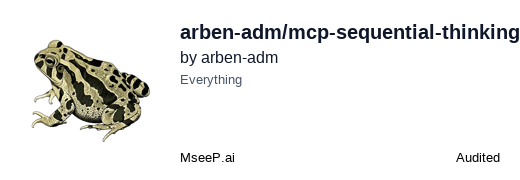A Model Context Protocol (MCP) server that facilitates structured, progressive thinking through defined stages. This tool helps break down complex problems into sequential thoughts, track the progression of your thinking process, and generate summaries.
- Structured Thinking Framework: Organizes thoughts through standard cognitive stages (Problem Definition, Research, Analysis, Synthesis, Conclusion)
- Thought Tracking: Records and manages sequential thoughts with metadata
- Related Thought Analysis: Identifies connections between similar thoughts
- Progress Monitoring: Tracks your position in the overall thinking sequence
- Summary Generation: Creates concise overviews of the entire thought process
- Persistent Storage: Automatically saves your thinking sessions with thread-safety
- Data Import/Export: Share and reuse thinking sessions
- Extensible Architecture: Easily customize and extend functionality
- Robust Error Handling: Graceful handling of edge cases and corrupted data
- Type Safety: Comprehensive type annotations and validation
- Python 3.10 or higher
- UV package manager (Install Guide)
- Pydantic: For data validation and serialization
- Portalocker: For thread-safe file access
- FastMCP: For Model Context Protocol integration
- Rich: For enhanced console output
- PyYAML: For configuration management
mcp-sequential-thinking/
├── mcp_sequential_thinking/
│ ├── server.py # Main server implementation and MCP tools
│ ├── models.py # Data models with Pydantic validation
│ ├── storage.py # Thread-safe persistence layer
│ ├── storage_utils.py # Shared utilities for storage operations
│ ├── analysis.py # Thought analysis and pattern detection
│ ├── testing.py # Test utilities and helper functions
│ ├── utils.py # Common utilities and helper functions
│ ├── logging_conf.py # Centralized logging configuration
│ └── __init__.py # Package initialization
├── tests/
│ ├── test_analysis.py # Tests for analysis functionality
│ ├── test_models.py # Tests for data models
│ ├── test_storage.py # Tests for persistence layer
│ └── __init__.py
├── run_server.py # Server entry point script
├── debug_mcp_connection.py # Utility for debugging connections
├── README.md # Main documentation
├── CHANGELOG.md # Version history and changes
├── example.md # Customization examples
├── LICENSE # MIT License
└── pyproject.toml # Project configuration and dependencies
-
Set Up Project
# Create and activate virtual environment uv venv .venv\Scripts\activate # Windows source .venv/bin/activate # Unix # Install package and dependencies uv pip install -e . # For development with testing tools uv pip install -e ".[dev]" # For all optional dependencies uv pip install -e ".[all]"
-
Run the Server
# Run directly uv run -m mcp_sequential_thinking.server # Or use the installed script mcp-sequential-thinking
-
Run Tests
# Run all tests pytest # Run with coverage report pytest --cov=mcp_sequential_thinking
Add to your Claude Desktop configuration (%APPDATA%\Claude\claude_desktop_config.json on Windows):
{
"mcpServers": {
"sequential-thinking": {
"command": "uv",
"args": [
"--directory",
"C:\\path\\to\\your\\mcp-sequential-thinking\\run_server.py",
"run",
"server.py"
]
}
}
}Alternatively, if you've installed the package with pip install -e ., you can use:
{
"mcpServers": {
"sequential-thinking": {
"command": "mcp-sequential-thinking"
}
}
}You can also run it directly using uvx and skipping the installation step:
{
"mcpServers": {
"sequential-thinking": {
"command": "uvx",
"args": [
"--from",
"git+https://github.com/arben-adm/mcp-sequential-thinking",
"--with",
"portalocker",
"mcp-sequential-thinking"
]
}
}
}The server maintains a history of thoughts and processes them through a structured workflow. Each thought is validated using Pydantic models, categorized into thinking stages, and stored with relevant metadata in a thread-safe storage system. The server automatically handles data persistence, backup creation, and provides tools for analyzing relationships between thoughts.
The Sequential Thinking server exposes three main tools:
Records and analyzes a new thought in your sequential thinking process.
Parameters:
thought(string): The content of your thoughtthought_number(integer): Position in your sequence (e.g., 1 for first thought)total_thoughts(integer): Expected total thoughts in the sequencenext_thought_needed(boolean): Whether more thoughts are needed after this onestage(string): The thinking stage - must be one of:- "Problem Definition"
- "Research"
- "Analysis"
- "Synthesis"
- "Conclusion"
tags(list of strings, optional): Keywords or categories for your thoughtaxioms_used(list of strings, optional): Principles or axioms applied in your thoughtassumptions_challenged(list of strings, optional): Assumptions your thought questions or challenges
Example:
# First thought in a 5-thought sequence
process_thought(
thought="The problem of climate change requires analysis of multiple factors including emissions, policy, and technology adoption.",
thought_number=1,
total_thoughts=5,
next_thought_needed=True,
stage="Problem Definition",
tags=["climate", "global policy", "systems thinking"],
axioms_used=["Complex problems require multifaceted solutions"],
assumptions_challenged=["Technology alone can solve climate change"]
)Generates a summary of your entire thinking process.
Example output:
{
"summary": {
"totalThoughts": 5,
"stages": {
"Problem Definition": 1,
"Research": 1,
"Analysis": 1,
"Synthesis": 1,
"Conclusion": 1
},
"timeline": [
{"number": 1, "stage": "Problem Definition"},
{"number": 2, "stage": "Research"},
{"number": 3, "stage": "Analysis"},
{"number": 4, "stage": "Synthesis"},
{"number": 5, "stage": "Conclusion"}
]
}
}Resets the thinking process by clearing all recorded thoughts.
- Decision Making: Work through important decisions methodically
- Problem Solving: Break complex problems into manageable components
- Research Planning: Structure your research approach with clear stages
- Writing Organization: Develop ideas progressively before writing
- Project Analysis: Evaluate projects through defined analytical stages
With the proper MCP setup, simply use the process_thought tool to begin working through your thoughts in sequence. As you progress, you can get an overview with generate_summary and reset when needed with clear_history.
For detailed examples of how to customize and extend the Sequential Thinking server, see example.md. It includes code samples for:
- Modifying thinking stages
- Enhancing thought data structures with Pydantic
- Adding persistence with databases
- Implementing enhanced analysis with NLP
- Creating custom prompts
- Setting up advanced configurations
- Building web UI integrations
- Implementing visualization tools
- Connecting to external services
- Creating collaborative environments
- Separating test code
- Building reusable utilities
MIT License



